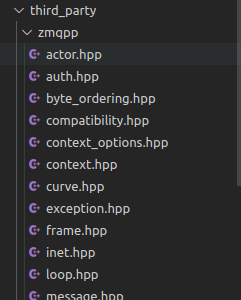ZeroMQ官网
linux平台
一、安装libzmq
1、下载代码:git clone https://github.com/zeromq/libzmq.git
2、切换到最新的tag,目前是v4.3.3:git checkout v4.3.3
3、配置:cd libzmq && ./configure --prefix=/home/xxx/libzmq/_install
4、编译并安装:make -j4 && sudo make install
在配置时根据需求更改安装目录,如果是安装在linux平台上可以直接安装到/usr
若是交叉编译到ARM-LINUX上,要在Makefile中修改编译工具链,并安装到自己指定的目录下
只需要安装libzmq就可以使用ZeroMQ的通信功能了,但是由于libzmq本身是用C写的,为了方便C++用户,官方有做了一个针对C++的接口封装,方便C++用户使用C++类和对象进行编程。可以下载和编译cppzmq或在zmqpp库。
二、安装zmqpp
因为zmqpp是对libzmq接口的高层次的封装,是c++接口中最好用的一个,所以选择了zmqpp库
1、下载代码:git clone https://github.com/zeromq/zmqpp.git
2、切换到最新的tag,目前是v4.2.0:git checkout v4.2.0
3、编译并安装:make -j4 && sudo make install
同样需要安装到指定目录或在交叉编译,在Makefile中指定
三、在cmake工程中使用zmqpp
1. 在third_party添加zmqpp相关头文件

2. 在lib目录下添加静态库zmq, zmqpp

3. 在cmakelists中添加配置
... include_directories(net lib) link_libraries( ${CMAKE_CURRENT_SOURCE_DIR}/lib/libzmq.a ${CMAKE_CURRENT_SOURCE_DIR}/lib/libzmqpp.a pthread ) add_executable(server server.cpp) add_executable(client client.cpp) target_link_libraries(server pthread zmqpp zmq) ...
4. 在源码中添加头文件

1 #include "third_party/zmqpp/zmqpp.hpp" 2 #include <string> 3 #include <iostream> 4 #include <chrono> 5 #include <thread> 6 7 using namespace std; 8 9 int main(int argc, char *argv[]) { 10 const string endpoint = "tcp://*:5555"; 11 12 // initialize the 0MQ context 13 zmqpp::context context; 14 15 // generate a pull socket 16 zmqpp::socket_type type = zmqpp::socket_type::reply; 17 zmqpp::socket socket (context, type); 18 19 // bind to the socket 20 socket.bind(endpoint); 21 while (1) { 22 // receive the message 23 zmqpp::message message; 24 // decompose the message 25 socket.receive(message); 26 string text; 27 message >> text; 28 29 //Do some 'work' 30 std::this_thread::sleep_for(std::chrono::seconds(1)); 31 cout << "Received Hello" << endl; 32 socket.send("World"); 33 } 34 35 }

1 #include "third_party/zmqpp/zmqpp.hpp" 2 #include <string> 3 #include <iostream> 4 5 using namespace std; 6 7 int main(int argc, char *argv[]) { 8 const string endpoint = "tcp://localhost:5555"; 9 10 // initialize the 0MQ context 11 zmqpp::context context; 12 13 // generate a push socket 14 zmqpp::socket_type type = zmqpp::socket_type::req; 15 zmqpp::socket socket (context, type); 16 17 // open the connection 18 cout << "Connecting to hello world server…" << endl; 19 socket.connect(endpoint); 20 int request_nbr; 21 for (request_nbr = 0; request_nbr != 10; request_nbr++) { 22 // send a message 23 cout << "Sending Hello " << request_nbr <<"…" << endl; 24 zmqpp::message message; 25 // compose a message from a string and a number 26 message << "Hello"; 27 socket.send(message); 28 string buffer; 29 socket.receive(buffer); 30 31 cout << "Received World " << request_nbr << endl; 32 } 33 }
5. 测试

参考:
跟我一起学习ZeroMQ(3):安装libzmq和zmqpp(接下来基于zmqpp实现多种zmq通讯模式)
ZeroMQ推荐博客:
